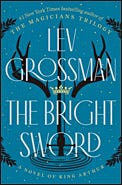Do we need another novel about the Knights of the Round Table? Sure, if it explores that territory in new, exciting, surprising ways.
Lev Grossman’s The Bright Sword picks up after the Battle of Camlann and King Arthur’s disappearance. The central character is Collum, a young man who honed his talent for swordcraft in the backwater to which an uncaring stepfather banished him, echoing King Arthur’s own background. Not having heard about the recent Battle of Camlann, Collum journeys to Camelot and presents himself there, hoping to begin a career as a knight. Instead, he discovers a few demoralized men and women trying half-heartedly to figure out how to live on in a world that has crumbled.
Like many Arthurian novels, this is and isn’t a historical novel. It stays true to the body of legends about Arthur that arose in the high medieval period, placing the characters in the cultural environment of that time rather than of the immediate post-Roman era when the real Arthur, if there was one, lived and led armies. Knights clank about in armor. Christian mysticism vies with an older pagan mysticism and sometimes blends with it. Extensive research underpins the story.
At the same time, The Bright Sword is also a fantasy novel set in a fantasy past. Grossman freely invents magical events and journeys, taking his inspiration from the magic in the King Arthur legends—mystical visions of the Grail and other Christian symbols, half-human women with magical powers, giants, flying ships and more. Along the way, he explores questions that continue to burn in the present about religious dogma, gender mismatches, abuse of power, struggles with depression, and more.
Readers who have enjoyed other novels of King Arthur will enjoy this one. It’s a fresh take on the story, consistent with the best of the genre while leaping beyond to a new exploration of its meaning and impact. (2024, 673 pages, including a Historical Note by the author)





This is a must read! Thank you. :)